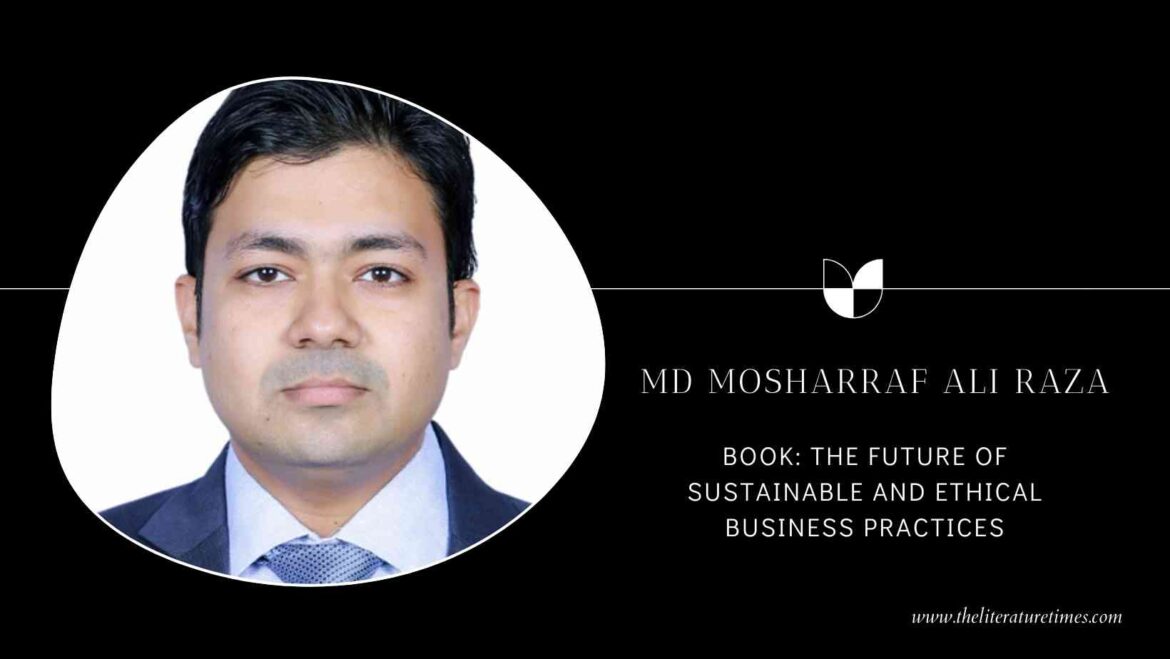The Literature Times: What inspired you to write “The Future of Sustainable and Ethical Business Practices”? Can you share a specific experience or realization that led to the creation of this book?
MD Mosharraf Ali Raza: The inspiration for writing “The Future of Sustainable and Ethical Business Practices” came from my extensive career in finance, audit, and consulting, where I observed firsthand the growing importance of sustainability and ethics in the business world. A pivotal moment for me was when I collaborated with a company struggling to balance profitability with its social and environmental responsibilities. This experience highlighted the urgent need for businesses to adopt sustainable practices not just as a trend but as a core part of their operations. I realized that many companies still lacked a clear understanding of how to integrate these principles into their business models effectively. This book is my attempt to bridge that gap by providing practical guidance and real-world examples.
The Literature Times: In your book, you emphasize the importance of integrating sustainability and ethics into business practices. How do you define the balance between profitability and positive societal impact?
MD Mosharraf Ali Raza: Balancing profitability with a positive societal impact is about creating a business model where financial success and ethical responsibility are not mutually exclusive but rather mutually reinforcing. Profitability ensures the business’s survival, while sustainability and ethics build trust, brand loyalty, and long-term value. I believe that businesses can achieve this balance by adopting a comprehensive approach that considers the impact of their operations on all stakeholders, including employees, customers, communities, and the environment. By embedding ethical practices into the core of their business strategy, companies can drive innovation, enhance their reputation, and achieve sustainable growth.
The Literature Times: Can you elaborate on the three main pillars of sustainability—environmental protection, social responsibility, and economic viability? How can businesses effectively address all three simultaneously?
MD Mosharraf Ali Raza: The three pillars of sustainability—environmental protection, social responsibility, and economic viability—are interconnected and must be addressed simultaneously for a business to be truly sustainable. Environmental protection involves minimizing the negative impact of business activities on the planet, such as reducing carbon emissions and conserving natural resources. Social responsibility focuses on the well-being of people, ensuring fair labor practices, diversity, equity, and community engagement. Economic viability ensures that the business remains profitable and competitive. Businesses can effectively address all three by integrating sustainability into their strategic planning, setting clear goals and metrics, and fostering a culture of continuous improvement. For example, by investing in renewable energy, companies can reduce their environmental footprint, create jobs, and save on operational costs, thereby achieving a balance across all three pillars.
The Literature Times: You’ve provided numerous case studies in your book. Could you share one or two examples of companies that have successfully implemented sustainable and ethical practices and the outcomes they achieved?
MD Mosharraf Ali Raza: One example I discuss in the book is Patagonia, an outdoor clothing company that has become a leader in sustainable and ethical business practices. Patagonia has committed to using environmentally friendly materials, reducing waste, and promoting fair labor practices. Their approach has not only helped the environment but also strengthened their brand, resulting in a loyal customer base and consistent financial growth.
Another example is Unilever, which has integrated sustainability into its business model through its Sustainable Living Plan. By focusing on reducing environmental impact, improving health and well-being, and enhancing livelihoods, Unilever has achieved significant cost savings, increased consumer trust, and long-term profitability. These companies demonstrate that sustainability and ethics can be powerful drivers of business success.
The Literature Times: What are some common challenges that businesses face when trying to implement sustainable and ethical practices, and how can they overcome these obstacles?
MD Mosharraf Ali Raza: One of the most common challenges is the perception that sustainability and ethics are costly or that they require significant changes to existing business models. This mindset can create resistance to change, especially in industries where profit margins are tight. To overcome this, businesses need to recognize that sustainability is not an expense but an investment that can lead to long-term benefits, such as cost savings, enhanced reputation, and risk mitigation. Another challenge is the lack of expertise or resources to implement sustainable practices effectively. Companies can address this by partnering with experts, investing in employee training, and leveraging technology to track and measure their sustainability efforts. Additionally, clear communication and leadership commitment are essential to driving change and overcoming these challenges.
The Literature Times: In your opinion, how do emerging trends such as digital transformation and increased consumer awareness impact the future of ethical business practices?
MD Mosharraf Ali Raza: Emerging trends like digital transformation and increased consumer awareness are significantly shaping the future of ethical business practices. Digital transformation allows businesses to operate more efficiently, reduce waste, and enhance transparency by leveraging data and technology. For example, blockchain technology can provide traceability in supply chains, ensuring that products are sourced and manufactured ethically. Increased consumer awareness is driving demand for products and services that align with ethical values. Consumers today are more informed and expect companies to be accountable for their social and environmental impact. This shift in consumer behavior is pushing businesses to adopt more sustainable practices or risk losing market share. Together, these trends are creating a new business landscape where ethics and sustainability are not just competitive advantages but essential for survival.
The Literature Times: Your book includes strategies for integrating ethical practices into business models. How can small and medium-sized enterprises (SMEs) apply these strategies effectively given their unique constraints compared to larger corporations?
MD Mosharraf Ali Raza: SMEs often face unique challenges, such as limited resources and smaller teams, which can make it difficult to implement comprehensive sustainability strategies. However, SMEs can still make a significant impact by focusing on areas where they can have the most influence. For example, they can start by adopting energy-efficient practices, sourcing materials responsibly, and fostering a positive workplace culture. SMEs should also leverage their agility to experiment with innovative approaches and build strong relationships with local communities and suppliers. Collaboration with other businesses and participation in industry networks can also provide SMEs with the support and knowledge they need to implement ethical practices. By embedding sustainability into their core values and operations, SMEs can differentiate themselves in the market and build long-term resilience.
The Literature Times: What role does leadership play in fostering a culture of sustainability and ethics within an organization? Can you provide examples of leadership behaviors or actions that support these values?
MD Mosharraf Ali Raza: Leadership plays a crucial role in fostering a culture of sustainability and ethics within an organization. Leaders set the tone for the entire company by demonstrating a commitment to ethical values and sustainable practices. For example, leaders who prioritize transparency, accountability, and long-term thinking inspire their teams to do the same. One key behavior is leading by example—when leaders make decisions based on ethical considerations and sustainability, it signals to the rest of the organization that these values are non-negotiable. Another important action is creating an environment where employees feel empowered to contribute to the company’s sustainability goals. This can be achieved through open communication, providing resources for innovation, and recognizing and rewarding efforts that align with the company’s ethical values. Leaders who are authentic in their commitment to sustainability can drive meaningful change within their organizations.
The Literature Times: How do you see the landscape of sustainable and ethical business practices evolving in the next 5 to 10 years? What major changes or trends do you anticipate?
MD Mosharraf Ali Raza: In the next 5 to 10 years, I expect to see sustainable and ethical business practices become even more integrated into mainstream business operations. One major trend I anticipate is the increasing importance of environmental, social, and governance (ESG) criteria in investment decisions. Investors are becoming more aware of the long-term risks associated with unsustainable business practices and are looking for companies that prioritize ESG factors. Another trend is the rise of circular economy models, where businesses focus on reducing waste and reusing materials, which will become more prevalent as resources become scarcer. Additionally, I believe we will see more businesses adopting purpose-driven models, where profitability is aligned with positive social and environmental outcomes. This shift will be driven by consumer demand, regulatory pressures, and the recognition that sustainability is essential for long-term success.
The Literature Times: You’ve had a diverse career in finance, audit, and consulting. How have these experiences shaped your views on sustainability and ethics in business? Are there any particular lessons from your career that you incorporated into the book?
MD Mosharraf Ali Raza: My career in finance, audit, and consulting has given me a unique perspective on the importance of sustainability and ethics in business. These fields have allowed me to see the inner workings of various industries and understand the financial and operational challenges they face. One key lesson I have learned is that ethical and sustainable practices are not just moral imperatives but also make good business sense. I have seen companies that prioritize these values outperform their peers in terms of resilience, customer loyalty, and risk management. Another lesson is the importance of transparency and accountability. In my work, I have encountered situations where a lack of transparency led to significant reputational and financial damage. This experience reinforced my belief that businesses must be open and honest about their practices if they want to build trust and succeed in the long run. These insights have been central to the themes and strategies I discuss in the book.



